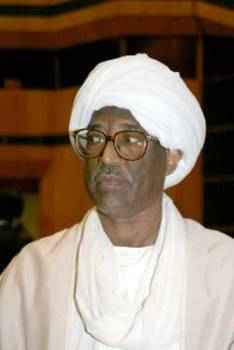Sudan says no to hybrid courts for Darfur crimes
September 21, 2009 (WASHINGTON) — Sudan will not accept any recommendations by an African Union (AU) commission recommending hybrid courts to try Darfur war crimes suspects, the head of a pro-government group said.

“The Sudanese constitution and laws reject the participation of foreign judges in Sudanese courts,” Khalil said.
“We have an independent and fair judicial system and so there is no need for hybrid courts,” he added.
A panel headed by former South African president Thabo Mbeki is wrapping up a set of recommendations for submission to the AU in the coming weeks on harmonizing accountability in Darfur with seeking peace.
The AU formed the panel last February in response to the imminent issuance of an arrest warrant by the International Criminal Court (ICC) based court for Sudanese president Omer Hassan Al-Bashir.
The timing of the formation of the panel caused many Darfuris to accuse the AU of attempting to shield Bashir from prosecution through recommending that he does not face the ICC.
The conviction was reinforced after the AU summit in Libya last month adopted a resolution not to cooperate with the ICC in arresting the Sudanese head of state.
The panel gave little indications of its recommendations on justice mechanisms but it appears all but certain that with propose hybrid courts as a compromise between international justice and local judiciary.
Sudanese figures interviewed by Mbeki’s panel have overwhelmingly dismissed the ability or willingness of Sudanese judiciary to prosecute Darfur criminals.
Barney Afako, a spokesperson for the AUPD told IWPR that that things are far more complex than prosecuting the perpetrators of war crimes.
“We shouldn’t just concentrate on the narrow context of justice, but on the long-term stability of Sudan,” he told IWPR. “Stability in Sudan is crucial for the whole region. Nine states border the country, and all are directly affected by conflict within its borders.
“Moreover, Sudan reflects many of the diversities that other African countries have. If these differences can co-exist in Sudan, this sends a powerful message to other countries in the region. That is why a solution must be found for Sudan and why the African Union is investing this kind of support,” he added.
It remains to be seen how Khartoum will react to the findings of the panel but Khalil said Sudan is open to a South Africa style Truth and reconciliation commission only.
A senior official at the International Center for Transitional Justice (ICTJ) in New York, who asked not to be named, told Sudan Tribune last week that he expects the panel to make a finding that the Sudanese judiciary “is unable and unwilling to carry out credible and genuine prosecutions in Darfur”.
“Based on what I know it is likely that the panel will recommend hybrid courts with the participation of Arab and African judges that conforms with international standards to try those not already charged by the ICC which means that Bashir and others will still have to answer at the Hague. Neither the panel nor the AU have the power to strip the ICC from its mandate particularly when Sudan has done little in that department,” the official said.
“I also expect them to call for a truth and reconciliation commission in Darfur,” he added.
The UN Security Council (UNSC) referred the situation in Darfur in March 2005 to the International Criminal Court (ICC) on recommendation from the UN Commission of Inquiry, Sudan insisted that it is capable of trying the suspects itself and rejected the jurisdiction of the international tribunal.
The ICC has so far charged Bashir along with former Sudanese state minister for humanitarian affairs and governor of South Kordofan Ahmed Haroun, militia leader Ali Kushayb and Bahr Idriss Abu Garda, the leader of the Darfur United Resistance Front (URF).
All the suspects remain at large with the exception of Abu Garda who appeared voluntarily before the ICC judges on charges related to attack on AU peacekeepers in Haskanita in 2007.
(ST)

Otong
Sudan says no to hybrid courts for Darfur crimes
Then your master el bashir will be going to Hague to face the ICC.
I hope it’s happing soon.
Time1
Sudan says no to hybrid courts for Darfur crimes
Humar al bashir is going to end up in ICC jail in Europe very soon wether he likes it or not because if ICC does not arrest Bashir then all the other leaders arrested by ICC will not have been t reated fairly as criminals of massacres and genicides.why is he afraid to go to the African-South American conference and send his deputy?He will be jailed soon for the crimes in Darfur.